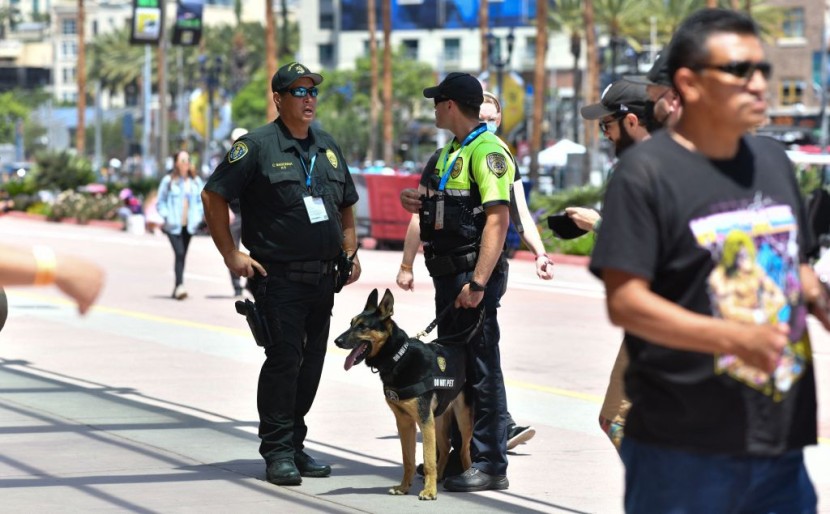
Some of the top police authorities in the United States expressed grave concern about the recent number of law enforcement officers quitting their positions at a pace never seen before.
Patrick Yoes, President of the National Fraternal Order of Police (FOP), raised the alarm during the third annual Faith & Blue conference in Washington, D.C. Tuesday, attended by around 100 law enforcement officers and journalists.
Yoes told the audience: "We see law enforcement officers leave our profession at a rate we've never seen before. Our profession is dependent on the best and brightest stepping up and taking this job. And because of the actions, and because of the turmoil that has happened in the last two years, we have a crisis right now in manpower."
Top officials from 19 local, state, and federal police agencies, including U.S. Secretary of State Alejandro Mayorkas, attended. Tuesday's meeting of the Department of Homeland Security was used to make announcements about the National Faith & Blue Weekend in 2022, which will take place from October 7 to October 10, according to Fox News.
Some prominent names in law enforcement have backed the event because it promotes dialogue and communication between religious communities, law enforcement institutions, and local communities.
Rev. Markel Hutchins, CEO of MovementForward and the primary organizer of the event, said that law enforcement organizations "will not be able to recruit or retain or attract new talent if police officers continue to have to work under the circumstances and situations that they're working under now."
He noted that the "stresses and the anxiety that's caused by the tensions" drive the US Police Crisis.
"There is no way to reduce crime and there is no way to attract new talent in law enforcement if we don't change the discussion and shift the narrative again away from the points of conversation that divide us, " Rev. Hutchins remarked.
More Law Enforcers Killed In Line of Duty
Per the information supplied by the FOP earlier this month, more than 210 police and law enforcement officials have been shot in the line of duty as of July 31 - up 14% from the same period the previous year.
Data from the National Law Enforcement Officers' Memorial Fund show the number of officers who died in the line of duty increased by 55% between 2020 and 2021, with COVID-19-related illnesses accounting for the vast majority of these deaths.
Additionally, statistics from the Major Cities Chiefs Association reveal a 50% increase in homicides in major cities since 2019.
Killings and gun violence are increasing from Philadelphia to Portland to Los Angeles at the same time that officers are retiring or quitting faster than they can be replaced because they are worn out by the pandemic and disillusioned by the calls to abandon policing in the wake of George Floyd's murder, US News reported.
In addition to reexamining what services they can offer and what role police should perform in their communities, departments struggle to fill positions in a competitive labor market. To keep up with 911 calls, several have moved seasoned officers to patrol and dissolved specialized units that had been in place for years.
According to a poll conducted nationwide in June 2021 by the Police Executive Research Forum, 93% of budgeted positions were typically filled by police agencies nationwide.
The survey indicated that retirements are up 45% over the previous year, and resignations are up 18%.
Bureau of Justice Statistics data indicates that USA police must complete an average of 8 months of training before they are ready to patrol the streets on their own. As a result, it will take years for departments all over the country to fill job vacancies.
The Impact of the Shortage of US Law Enforcers
The reasons for the US Police Crisis are attributable to "multiple social, political, and According to a September 2019 poll by the International Association of Chiefs of Police, "economic forces" include generational differences, unfavorable attitudes toward policing, and the lengthy hiring procedures of many agencies, per CNN.
In addition, low pay and the "great resignation," in which people left their occupations willingly in previously unheard-of numbers after the pandemic, affected policing much as they did other professions.
The study indicates the impact of the issue on cities includes longer queues for service calls, fewer crimes solved, and exhausted on-duty officers that "threaten the quality of life in our communities."
Atlanta's Interim Police Chief Darin Schierbaum noted: "One of the challenges now is every ... police department is looking for the same group of talented motivated individuals that have the heart to serve."
Related Article: FDA Issues Emergency Use Authorization To Stretch Out Supply of Monkeypox Vaccine Amid High Demand
© 2025 HNGN, All rights reserved. Do not reproduce without permission.








